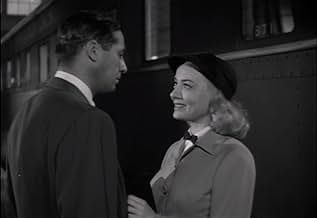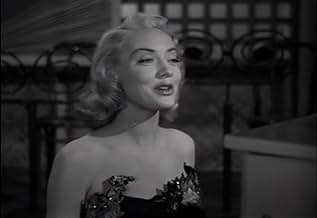Ajouter une intrigue dans votre langueDuring the 1950s, a small-town newspaper editor and a state assistant attorney-general fight corrupt local officials from one rotten county.During the 1950s, a small-town newspaper editor and a state assistant attorney-general fight corrupt local officials from one rotten county.During the 1950s, a small-town newspaper editor and a state assistant attorney-general fight corrupt local officials from one rotten county.
- Réalisation
- Scénario
- Casting principal
- Bailiff
- (as Bob Stephenson)
Avis à la une
Some time later, Pidgeon returns home--briefly. There's not much of an explanation where he was, he's ready to move to Detroit and he has no interest in following up on his articles on corruption. It's obvious he's scared and has no intention of continuing. Can Hodiak change his mind? He sure needs Pidgeon's help with the investigation.
All in all, an exceptional film--tough, exciting and well-acted. My only quibble, and it's a little one, is that the film is a tad preachy at the end. Still, it's a nice film--well worth seeing--especially since the cast was so capable. In addition to Hodiak and Pidgeon, the film has support from Audrey Totter (who plays a great dame), Thomas Gomez (who's almost always the heavy), Everett Sloan, Cameron Mitchell, Whit Bissell, Karl Malden and Frank Cady (Sam Drucker from "Green Acres")--a very impressive list. It was also cool seeing Burt Mustin playing the corrupt judge--the sort of role you wouldn't expect from this fun character actor.
This is an okay movie, although predictable, with good performances. It does point out that ethics aren't just for people who have nothing to lose, when it's easy. True ethics are for the tough times, when one is faced with huge losses.
Good cast.
Still and all, the longer the movie lasts, the more momentum it loses, ending with a final 20 minutes of plodding courtroom procedure. There's still some suspense in the air (why did Allridge skip town), but the initial energy has long since dissipated. At least part of the problem lies with uninspired direction that can't sustain the early sense of tension and evil. Too bad noir maestros like Phil Karlson or Anthony Mann weren't running the show. Those reviewers contrasting this film with Karlson's similar Phenix City Story are right on target. Nonetheless, the movie does have its moments, along with a vibrant turn from the under- rated Audrey Totter who never seemed to get the recognition her talent deserved.
I should also add that much in this story seems reflective of my own experience. When I was in the army (1963-1965) a decade after this film, and stationed in Western Maryland, when driving there from New York, we were picked up more than once by police for speeding, having a light out, whatever, and instructed to drive behind the police vehicle to one of several (what looked like) county stores that had a set up in the back where someone (probably a minor judge) seemed to sit all night, just waiting for the cops to bring in miscreants like ourselves so that he could fine us $15 or $20 before sending us on our way. And this is how they treated the U.S. military ($78.11 a month pay). I can't imagine how others might have been treated (but certainly not as badly as in this film, I hope).
Anyway, the performances are all solid. Pidgeon kind of disappears a bit less than halfway through the film, and from that point on the real stars seem to be Hodiak, Malden, Gomez, Sloane and the always-excellent Audrey Totter, until Pidgeon comes back in near the end. The final courtroom scene holds the interest, and both Hodiak and Hugh Sanders (as the good judge and in, given its relative brevity, probably the best role he ever had; he gets to make the longest speech in the film) do well in it, but I was surprised to see Karl Malden billed 7th or 8th considering that he had just won a Supporting Actor AA for STREETCAR and, quite honestly, his is one of the larger roles in the film. And Frank Cady has maybe his best screen role, far larger than in the same year's HIGH NOON. Cameron Mitchell, in one of his first films, also doesn't have much to do, but his character is pivotal to the story.
All in all, an enjoyable little crime drams with a lot of holes in it, saved by the performances.
Le saviez-vous
- AnecdotesFinal film of Richard Cramer, whose career started back in the days of silent films.
- GaffesAt about the 06:30 mark the shadow of the boom mic can be seen on the wall to the left just as Allridge and Jackson are being put into the cell.
- Citations
Chick Johnson: Buck is everybody around here chicken?
Capt. Buck Maxwell: You ever been scared of losing your job? Having your little store maybe burned out? or your truck wrecked? or getting beat up? Maybe crippled or lying around on a Phony Rap? Or maybe having your wife bothered or even your kids?
Chick Johnson: Scared or Bought?
Capt. Buck Maxwell: Bought guys talk slick. These guys talk sore. Here. You ever noticed this thing? These guys have all been called in for the Treatment.
- Crédits fousThe opening credits all appear on newspapers which have just been dumped from a truck and are ready for delivery. The title appears as if it were a newspaper headline.
- ConnexionsReferenced in Crime Wave (1985)
- Bandes originalesYou Can't Do Wrong Doing Right
(uncredited)
Written by Al Rinker and Floyd Huddleston
Performed by Ruth Martin
[Sung by the character Cleo Bethel portrayed by Audrey Totter]
Meilleurs choix
Détails
- Date de sortie
- Pays d’origine
- Langue
- Aussi connu sous le nom de
- The Sellout
- Lieux de tournage
- Société de production
- Voir plus de crédits d'entreprise sur IMDbPro
Box-office
- Budget
- 596 000 $US (estimé)
- Durée1 heure 23 minutes
- Couleur
- Rapport de forme
- 1.37 : 1
Contribuer à cette page







































